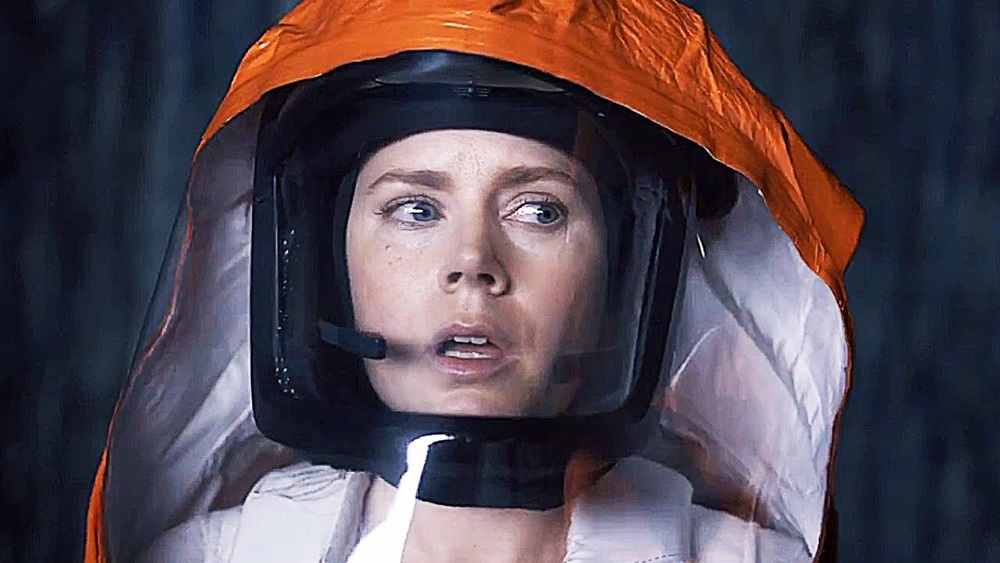By Rohan Murti
There’s a certain mindset that drives people towards watching films like Denis Villeneuve’s Arrival; somewhere deep down, their sanity-driven and logically-maneouvered thought processes are a nebulous belief that is so strong, it’s scarcely ludicrous: Will we ever get invaded?
Arrival, like every other Hollywood venture compliments something unthinkable with explicitly justified logic. Going into the movie, I expected X-men: Apocalypse style demolition, with everything except the Taj Mahal and Big Ben being reduced to rubble. (To my pleasant surprise) this wasn’t the case; the film focuses more on the initial stages of invasion rather than the portrayal of their destructive might.
Amy Adams portrays the role of Dr. Louise Banks, a linguistics professor who loves ‘approaching language as a mathematician,’ in theoretical physicist Ian Donnelly’s (Jeremy Renner) opinion. Louise’s character makes us empathise with her, probably because the very first scene in the film shows us how she loses her daughter, Hannah, to cancer. While films like Koi Mil Gaya made us believe that aliens could only arrive in spaceships the size of twenty football fields, Arrival’s spaceships were arguably more realistic and, boy, are they huge! The world wakes up to find twelve egg-shaped, enormous spaceships that have descended in twelve separate locations around the world. As soon as you secretly start wishing that India is part of the league, you may secretly also start wondering if the aliens are, in fact, extra-terrestrial allies of the Al Qaeda. Because, yes, the two Asian nations chosen are China and our friendly neighbour, Pakistan. But the unintended giggles fall silent when we’re introduced to the ‘Heptopods’: the seven-legged creatures that growl with sounds more resonant and horrifying than the mighty T-Rex. Ian naturally names them after the iconic comic duo, Abbott and Costello.

Perhaps the most amazing aspect to the film is the communication part; where simple questions like, “What is your name?” are answered in absurd, rather uncanny symbols, resembling huge circles with ivy-like branches protruding from their edges. These are aspects to a sci-fi venture that make it all the more believable, something that gives ‘Arrival’ a similar edge. The film has references to Whorfianism, a concept involving linguistic relativity — or in simple words, the way in which our language affects our cognition. Louise’s independent perception about the purpose of the invasion doesn’t seem to go well with the heads of the military, who plant bombs in the spaceship positioned in Montana. China leads a league of nations who ‘aren’t ready to give in’ to their new-found enemies and claims to launch attacks on them. Pakistan renders its support, quite unsurprisingly. Abbott loses its life in a bomb blast that actually convinces the audience to sympathise with our peculiar inter-galactic pal.
Arrival places itself in a one-of-a-kind category, despite being based on a frequently experimented topic, only because of its difference — and exploration — of perception. Louise Banks’ character is multi-faceted, and struggles to decipher the non-linear perception of Abbott and Costello. But gradually as she begins to understand it, she also encounters various demons from different times of her life. This is not as straightforward as it sounds, though. For those who’ve watched and (partially) understood Christopher Nolan’s Inception and Interstellar and experiments with space and time, this will be quite a welcome visceral addition. It is only after watching the film that one realises why it’s called ‘Arrival’ and not ‘Invasion’; it speaks of an inclusive benevolence beyond words.
Denis Villeneuve hereby forays into a different kind of sci-fi cinema category that works well by making its audience believe in its content, despite its inherently abstract and artful form. More importantly, he equips us with a fresh perception of a whole new species, both literally and figuratively, unknown to most of humanity. Until, of course, Louise makes her move.









Leave A Comment
You must be logged in to post a comment.